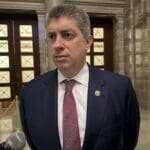Ron DeSantis is waging an all-out war on Florida residents' civil rights
Florida’s Republican governor has passed a flurry of bills this month attacking abortion rights, LGBTQ rights, and voting rights, making districts less representative, and creating a police force just for elections.

This month alone, Florida Gov. Ron DeSantis has passed several pieces of legislation of deep concern to civil rights activists.
On Monday, DeSantis signed a bill to create a special police force dedicated to monitoring elections. Following what is a national playbook for Republicans, after Donald Trump’s insistence that the 2020 election was rigged, the governor addressed voter fraud in his state, even with virtually no evidence of it. Following the 2020 elections, the AP examined voter fraud nationally and found too little to be relevant to the election results.
“This new election crime task force has been developed to solve a problem that does not exist,” state Rep. Yvonne Hayes Hinson said in a statement. “Its implementation will put up additional barriers to voting and targets communities of color. This bullying tactic will intimidate and immobilize workers, families, and everyday people.”
“We will examine any law that is passed and implement it accordingly,” Miami-Dade County Elections Supervisor Christina White told the American Independent Foundation in a phone call.
On April 15, DeSantis banned 54 math textbooks from Florida public schools for supposedly containing material related to Critical Race Theory (CRT) and Social and Emotional Learning (SEL). U.S. Rep Charlie Crist requested more information from the governor, asking for transparency in the decision, and saying, “Forty-one math books that we don’t know why, we don’t know what the purpose was behind it. You the people have a right to know.
On April 14, DeSantis signed a 15-week abortion ban for most pregnant people, including victims of rape, incest, and human trafficking — making Florida the latest GOP-controlled state to enact an extreme abortion ban.
“Nobody should be forced to travel hundreds or even thousands of miles for essential health care — but in signing this bill, Gov. DeSantis will be forcing Floridians seeking abortion to do just that,” Planned Parenthood Action Fund President Alexis McGill Johnson said in a statement. “Floridians want to be able to make decisions about their health and their families, without interference from politicians.”
Last week, DeSantis signed a bill that would sunset Disney’s special tax and governance area known as Reedy Creek Improvement Area, which is home to Disney World. Disney’s special status, which went into effect in 1967, allows it to collect taxes and issue bonds. It also exempts it from most state regulations.
The bill was passed in response to Disney’s opposition to the governor’s other legislative initiative, the Parental Rights in Education bill, otherwise known as the “Don’t Say Gay“ bill.
After a long silence on the issue, Disney CEO Bob Chapek was finally prompted by employees to criticize the bill, saying in a company meeting that if the legislation becomes law, “it could be used to target LGBTQ+ kids and families.”
Chapek’s comments drew an angry response from DeSantis. “I think that crossed the line,” he said, according to NPR. “This state is governed by the interests of the people of the state of Florida. It is not based on the demands of California corporate executives.”
According to the New York Times, DeSantis wrote in a fundraising email, “If Disney wants to pick a fight, they chose the wrong guy.”
NPR also reported that Florida Senate President Wilton Simpson claimed that these measures were not retaliatory, they simply reflected the feeling that businesses should not be granted such privileges. But this perspective was not universal within the GOP: Republican Rep. Jackie Toledo expressed the notion that Disney had been perverted by a “woke mob of liberal extremists.”
Disney found itself in the crosshairs of an “anti-woke” sentiment, and the butt of criticism not only from DeSantis and his followers but also from Fox News. As this conflict unfolded, one Florida state senator, Gary Farmer, tweeted that the Disney bill, while it was a “punitive, petulant political payback,” also served to distract from the governor’s other legislative move last week, and said the “much more devious and singular purpose of this special session,” which was the passage of a “racist and unconstitutional redistricting plan.”
The legislature provided an updated map last month, which would have given the GOP a two-seat edge against the Democrats, but the governor vetoed it claiming it was “unconstitutional.” He then produced his own map, drawn up by his staff, for the legislature to approve.
Florida gained one Congressional seat in 2022 due to population growth, giving the state a total of 28 seats. At present, 16 Republicans and 11 Democrats represent Florida in the House of Representatives. The new maps would likely make that a 20-8 split, which would help Republicans’ chances of taking back control of the House from Democrats.
The Senate voted for the governor’s map along party lines, with every Democrat voting against it except one, Anette Taddeo, who boycotted the session to protest the governor’s overreach.
DeSantis’ newly approved maps would give Republicans a distinct advantage over Democrats, in a state where there are almost equal numbers of both. The maps would also eliminate two districts now held by Black Democrats, Rep. Al Lawson of Tallahassee and Rep. Val Demmings of Orlando, leaving just two majority-Black districts in Florida.
In another tweet, Farmer claimed that DeSantis is launching a “direct assault on Black representation in Florida, and is picking a fight w/Disney so voters look the other way.”
Within 24 hours of DeSantis’ map passing, multiple groups, including the League of Women Voters in Florida, Black Voters Matter, and Florida Rising, in addition to 12 voters from across the state, filed a suit in the circuit court of Leon County. The plaintiffs argued that the map violates the state constitution’s Fair Districts amendment, which bans redistricting in a way that infringes on minority voting rights.
Former U.S. Attorney General and Chairman of the National Democratic Redistricting Committee Eric Holder criticized the new Florida maps.
“Republicans across the country tried — and completely failed — to gerrymander their way to a congressional majority,” Holder said in a statement. “In response to this defeat, DeSantis has bullied the legislature into enacting a map that does not allow for a fair electoral contest, and instead draws Republicans an illegitimate and illegal partisan advantage that they have not earned from the voters.”
Michael Li, senior counsel at the Brennan Center for Justice at New York University, told the American Independent Foundation that DeSantis even went beyond what Republican lawmakers in the state legislature wanted.
“Republicans do not need to gerrymander to hang on to power in Florida,” Li said, referring to the fact that they already hold a majority of seats.
Asked about the likelihood of the pending lawsuit succeeding, Li noted that Florida has traditionally had strong protections against gerrymandering and racial discrimination. But he pointed out that DeSantis has appointed three out of the seven Supreme Court judges, so the court is not the same as it was in 2015, when The League of Women Voters won their lawsuit against Republican gerrymandering.
It’s unclear what effect this map will have on the November elections, Li said, but it will be difficult for Florida’s courts to generate a new, fairer map in time to meet the July 9 deadline for mailing out ballots.
“There is a lot to be worried about,” Li said. “And it’s hard not to see politics in it.”
Published with permission of The American Independent Foundation.
Recommended

Ohio Gov. DeWine said he didn’t know of millions in FirstEnergy support. Is it plausible?
Ohio Gov. Mike DeWine’s claim to not know about the millions an Akron utility spent supporting his 2018 campaign for governor simply isn’t credible, an Ohio political scientist said in a recent interview. A spokesperson for DeWine pushed back. FirstEnergy provided that support, then spent more than $60 million to pass and protect a $1.3 billion ratepayer-financed […]
By Marty Schladen, Ohio Capital Journal - April 29, 2024
Missouri governor hopeful Bill Eigel rejects affordable childcare proposal
Eigel has previously supported stripping funds from public schools and once opposed an expansion of early kindergarten.
By Jesse Valentine - April 15, 2024
Montana Gov. Greg Gianforte hosts event with religious extremist
J.P. De Gance is the founder of Communio, an organization that uses social media marketing tools to push a far-right agenda.
By Jesse Valentine - March 27, 2024







































































